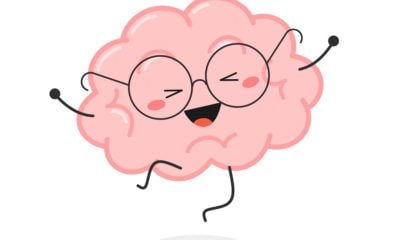5 Reasons We Shouldn’t Avoid Emotional Pain
We all want to be happier, right?
What if part of the path to increased happiness means embracing emotional pain?
As a therapist, I help people focus on the positive and the good in their lives everyday.
I encourage gratitude and mindfulness practices like Fill Your BAG Happy.
I also teach skills to re-frame negative thoughts and interpretations.
Now, you might think that the secret to being happy and healthy is to eliminate or avoid emotional pain or negative feelings.
Obviously, negative emotions are unpleasant; they make us feel “stuck” and out of control.
So, just don’t go there.
Well, I’m actually going to tell you the opposite today.
Avoiding emotional pain and building those emotional walls can often do more harm than good.
Here are 5 reasons NOT to avoid emotional pain.
1. All emotions have a role to play.
Do you remember the 2015 movie “Inside Out”?
If you missed it, the story is about a 12-year-old girl named Riley.
Her father gets relocated to a new city, so the family moves far away from the school, home, and friends she has always known.
The vast majority of the movie plays out inside Riley’s mind with the personification of her emotions as characters.
Early in the movie, Joy is in charge.
She clearly runs the show.
Joy is the strongest and most powerful emotion, often sending Sadness to go sit in a corner of the mind so as to not “tarnish” the girl’s memories and experiences.
Riley struggles with negative thoughts and emotions and begins to face challenges that Joy alone can’t solve.
The message of the film teaches us that all emotions have a place.
It stresses the importance of integration and cooperation.
Joy alone is not enough.
Sadness has a role and a place in our lives, as does Anger, Disgust, and Fear.
Riley became happier and more confident when her emotions worked together.
2. Suffering is more about our relationship to emotional pain than the pain itself.
Psychologist and Buddhist Meditation expert, Tara Brach expressed this beautifully when she said:
“Pain is not wrong.
Reacting to pain as wrong initiates the trance of unworthiness.
The moment we believe something is wrong, our world shrinks and we lose ourselves in the effort to combat the pain.” ― Tara Brach, Radical Acceptance: Embracing Your Life With the Heart of a Buddha
By interpreting our physical and emotional pain as ‘wrong’ and something to be pushed away, we create larger suffering.
3. What doesn’t kill us makes us stronger…
Personal growth often comes from emotional pain.
As the Buddhist saying goes:
“The lotus flower blooms from the darkest and thickest mud.”
It is important to recognize that darkness and pain can be a catalyst for growth and learning.
For example: experiencing fear when we are truly in physical harm can alert us that we need to get to safety.
Feelings of regret or guilt after hurting someone else (physically or emotionally) motivate us to think differently next time we are faced with a similar situation.
Guilt is often seen as negative when in reality, guilt can help us focus on the situation and can motivate us to repair damage or make amends.
Anger is another emotion, which can be helpful in that it creates space to be more proactive against inappropriate threats.
Anger connects us to others to take action for a greater purpose.
4. If you avoid the negative, you are less able to appreciate the positive.
If we avoid emotional pain, we are less likely to appreciate and savor healthy and sought-after emotions as well. In the book, the “Upside of Your Darkside”, the authors Todd Kashdan, Ph.D. and Robert Biswas-Diener, say:
“You cannot get rid of the negative emotions without unintentionally squelching happiness, meaning, grit, curiosity, maturity, wisdom and personal growth. Choose to numb the negatives and you numb the positives too.”
Therefore, when we experience the full range of emotional experiences, we are better able to gain emotional agility, flexibility, and resiliency.
5. Like a rubber band, what we push away only comes back stronger.
This is something I come across all the time in my practice as a psychotherapist.
When emotional pain is pushed down, away or not recognized, it grows.
It will find a way to make itself known and will do so in self-destructive ways.
Trying to escape or fix any emotional pain is often unsuccessful.
Accepting and recognizing that we all carry difficult thoughts, emotions, and negative feelings can be liberating.
The key is recognizing that this emotional pain does not define you.
It is something you are experiencing, not who you are.
Now, knowing this is a subtle, but key distinction.
We know that a constant and pervasive expression of letting negative emotions define us triggers problems with mental health, productivity, and emotional regulation.
Avoiding those emotions is NOT the answer.
Accepting that who we are is not defined by our psychological experiences is the key to a healthy balance.











